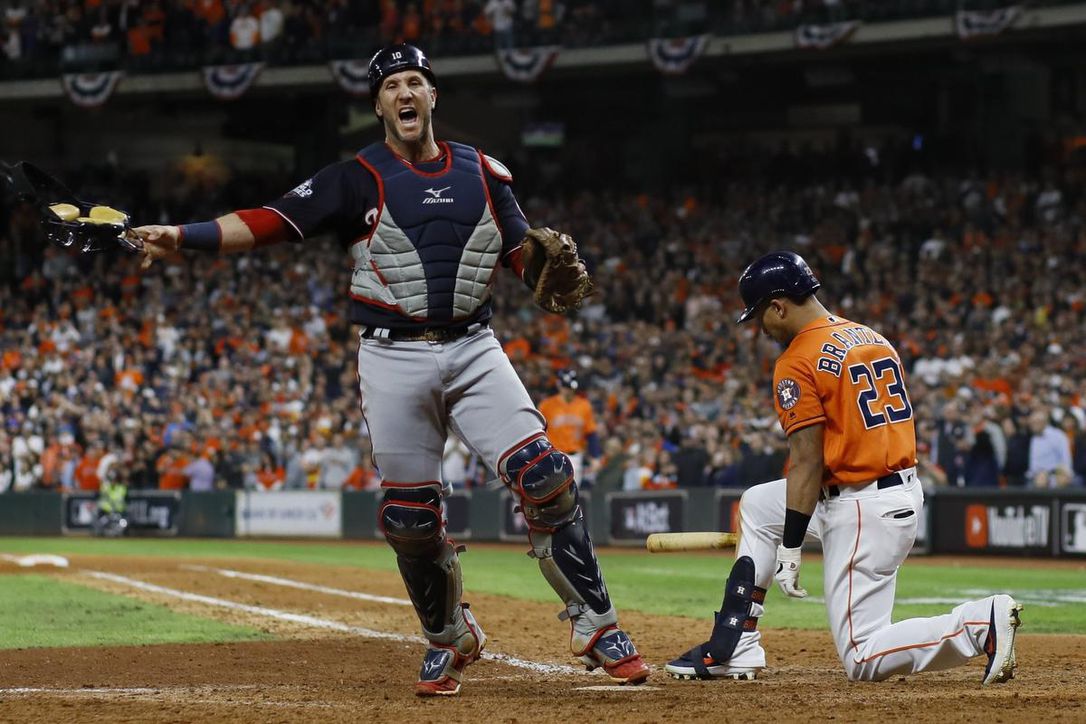I’ve been obsessing about “Casey at the Bat” during this World Series, perhaps triggered by something else: the fact that a Toronto team, the Raptors, finally won. So naturally I started thinking about losing, the way rich people often think about little except losing their money once they have it, and up loomed that poem — which reveals that the meaning of sport lies in defeat.
There aren’t many memorable sports poems and the lists all put Casey, written in 1888, first. That’s odd, since writer Ernest Lawrence Thayer, wasn’t a poet but a journalist — though he was a Harvard grad, a student of William James, psychology pioneer (and part-time mystic).
Memorable applies literally, since it rhymes like mad and is easy to remember. It’s doggerel, but great doggerel: And now the pitcher holds the ball and now he lets it go/And now the air is shattered by the force of Casey’s blow.
I’d say its message is that sports isn’t about winning, it’s about losing, which will always outweigh the victories over time. (The exception is the Harlem Globetrotters, who never lose to the Washington Generals, and so are seen as doing shows, not real games.)
Part of sports’ appeal is that in it, merit is more or less rewarded, far more than in areas like business, health, or politics. But merit doesn’t rule, even in sports, and when you win, chance plays a part, exactly like Kawhi’s four-bounce shot in the playoffs. The better team can lose, despite its merits. Hence sports is like life, but a little less so.
Note that “Casey at the Bat” is an American classic, despite its stress on losing, and that baseball is the “national pastime” there. It wasn’t baseball that celebrated winning as “the only thing,” a truly stupid notion, which spread from that fairly recent oddity, NFL football.
Baseball players seem relatively normal: no pads, helmet, masks. Even a lock for the Hall of Fame, like Justin Verlander, looks up from the dugout like a guy wondering if he should take an umbrella when he goes to the store, it’s awfully cloudy today. Then wham, comes that unforeseeable seventh inning of the seventh game.
One can be seduced by the mythos of winning, and think if you believe it, you will achieve it. A sportswriter I revere, Cathal Kelly, formerly of the Star now at the Globe, may have slipped mildly into this pit, after a lifetime of being disappointed by Toronto teams and the bulls--t spun by their owners, management and media retainers.
He seems to have grown entranced by having a winning attitude and repelled by its opposite. Washington fans now celebrating had it and, “Even a Canadian — so, someone very used to defeat, was impressed.” When the Raptors let one get away, “This was an awfully Toronto thing of them to do.” And when Washington triumphed, he declared, “the team that just won … is nothing but the will to win.” As if all you need is will, will is all you need. If only.

Poster for the 2018 film Campeones. The headline in English: THE ONLY SUPERHEROES WHO NEVER GET EVEN WITH ANYONE
I recently watched the 2018 Spanish film, “Campeones” (“Champions”), about a basketball team of people with disabilities coached by a former pro-level coach who has totally messed up his life. The games are played by actual people with disabilities. They make it to the finals against a much larger team. Their coach insists that truly competing must include winning.
Down a point with a second to go (spoiler) they launch a shot that bounces on the rim, like Kawhi’s, and — this isn’t Hollywood — doesn’t drop. The coach slumps in despair. But the players, and this is the key, waste not a second on self-laceration, they burst into a joyous celebration enveloping the winners, who also get it, and draw the coach in, who realizes what he’s learned.
It’s true they’re not “normal” but as the film asks, who — and what — is? Does normal mean winning is the only thing, or that you can will it?
--With thanks to Rick Salutin, Contributing Columnist, Toronto Star, October 31, 2019
Cover Photo: Daniel Hudson struck out Michael Brantley for the final out of the 2019 World Series
#CaseyattheBat #Astros #Nationals #TorontoStar #Raptors





Leave a comment
This site is protected by hCaptcha and the hCaptcha Privacy Policy and Terms of Service apply.